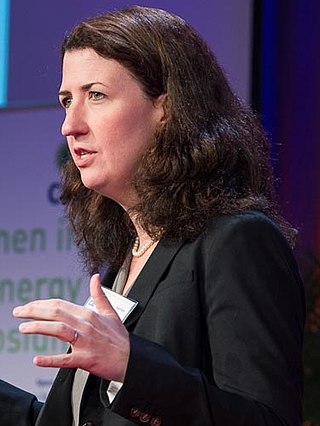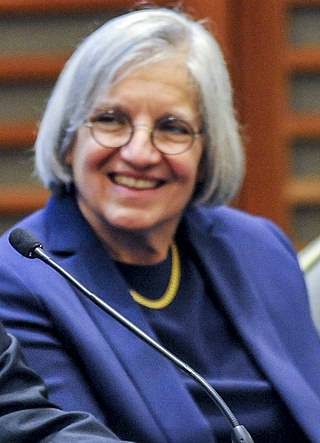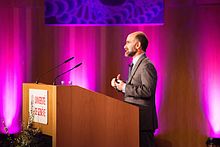
The National Academies of Sciences, Engineering, and Medicine (NASEM), also known as the National Academies, is a congressionally chartered organization that serves as the collective scientific national academy of the United States. The name is used interchangeably in two senses: (1) as an umbrella term or parent organization for its three sub-divisions that operate as quasi-independent honorific learned society member organizations known as the National Academy of Sciences (NAS), the National Academy of Engineering (NAE), and the National Academy of Medicine (NAM); and (2) as the brand for studies and reports issued by the unified operating arm of the three academies originally known as the National Research Council (NRC). The National Academies also serve as public policy advisors, research institutes, think tanks, and public administration consultants on issues of public importance or on request by the government.

Environmental health is the branch of public health concerned with all aspects of the natural and built environment affecting human health. To effectively control factors that may affect health, the requirements that must be met to create a healthy environment must be determined. The major sub-disciplines of environmental health are environmental science, toxicology, environmental epidemiology, and environmental and occupational medicine.

Mark Diesendorf is an Australian academic and environmentalist, known for his work in sustainable development and renewable energy. He currently researches at the University of New South Wales, Australia. He was formerly professor of environmental science and founding director of the Institute for Sustainable Futures at the University of Technology, Sydney and before that a principal research scientist with CSIRO, where he was involved in early research on integrating wind power into electricity grids. His most recent books are The Path to a Sustainable Civilisation (2023) and Sustainable Energy Solutions for Climate Change (2014).

The University of Wisconsin School of Medicine and Public Health (UWSMPH) is a professional school for the study of medicine and public health at the University of Wisconsin–Madison. It is one of only two medical schools in Wisconsin, along with the Medical College of Wisconsin in Milwaukee, and the only public one.

In Nigeria, there has been a major progress in the improvement of health since 1950. Although lower respiratory infections, neonatal disorders and HIV/AIDS have ranked the topmost causes of deaths in Nigeria, in the case of other diseases such as monkeypox, polio, malaria and tuberculosis, progress has been achieved. Among other threats to health are malnutrition, pollution and road traffic accidents. In 2020, Nigeria had the highest number of cases of COVID-19 in Africa.
The Joseph L. Mailman School of Public Health is the public health graduate school of Columbia University. Located on the Columbia University Irving Medical Center campus in the Washington Heights neighborhood of Manhattan, New York City, the school is accredited by the Council on Education for Public Health.
Barry S. Levy is a physician and former president of the American Public Health Association.

Gary Tabor is an American environmentalist with over 30 years' experience working on behalf of large scale conservation internationally as well as 12 years as a leader within the U.S. environmental philanthropic community. Tabor is known for his role as a catalyst in forwarding progress through large landscape conservation, pioneering the fields of Conservation Medicine and EcoHealth, and advising agencies and organizations about contemporary environmental issues.

Sir Andrew Paul Haines, FMedSci is a British epidemiologist and academic. He was the Director of the London School of Hygiene & Tropical Medicine from 2001 to 2010.

Malawi ranks 170th out of 174 in the World Health Organization lifespan tables; 88% of the population live on less than £2.40 per day; and 50% are below the poverty line.

The effects of climate change on human health are profound because they increase heat-related illnesses and deaths, respiratory diseases, and the spread of infectious diseases. There is widespread agreement among researchers, health professionals and organizations that climate change is the biggest global health threat of the 21st century.
Jonathan James Juliano is an American physician/scientist. He currently works at UNC School of Medicine.
Planetary Health is a multi- and transdisciplinary research paradigm, a new science for exceptional action, and a global movement. Planetary health refers to "the health of human civilization and the state of the natural systems on which it depends". In 2015, the Rockefeller Foundation–Lancet Commission on Planetary Health launched the concept which is currently being developed towards a new health science with over 25 areas of expertise.

Tracey Holloway is the Jeff Rudd and Jeanne Bissell Professor of Energy Analysis and Policy at the Nelson Institute for Environmental Studies at the University of Wisconsin-Madison and Department of Atmospheric and Ocean Sciences. Her research focuses on the links between regional air quality, energy, and climate through the use of computer models and date from satellites.
Environmental health policy is governmental action intended to prevent exposure to environmental hazards or to "eliminate the effects of exposure to environmental hazards".

Dyann F. Wirth is an American immunologist. She is currently the Richard Pearson Strong Professor of Infectious Diseases at Harvard T.H. Chan School of Public Health.
Disease ecology is a sub-discipline of ecology concerned with the mechanisms, patterns, and effects of host-pathogen interactions, particularly those of infectious diseases. For example, it examines how parasites spread through and influence wildlife populations and communities. By studying the flow of diseases within the natural environment, scientists seek to better understand how changes within our environment can shape how pathogens, and other diseases, travel. Therefore, diseases ecology seeks to understand the links between ecological interactions and disease evolution. New emerging and re-emerging infectious diseases are increasing at unprecedented rates which can have lasting impacts on public health, ecosystem health, and biodiversity.
Kristie L. Ebi is an American epidemiologist whose primary focus is the impact of global warming on human health. She is a professor of Global Health and Environmental and Occupational Health Sciences in the Department of Global Health at the University of Washington.

Global climate change has increased the occurrence of some infectious diseases. Infectious diseases whose transmission is impacted by climate change include, for example, vector-borne diseases like dengue fever, malaria, tick-borne diseases, leishmaniasis, zika fever, chikungunya and Ebola. One mechanism contributing to increased disease transmission is that climate change is altering the geographic range and seasonality of the insects that can carry the diseases. Scientists stated a clear observation in 2022: "The occurrence of climate-related food-borne and waterborne diseases has increased ."
Lewis H. Ziska is an American plant physiologist, academic and author. He is an associate professor in the Environmental Health Sciences at the Mailman School of Public Health at Columbia University.













